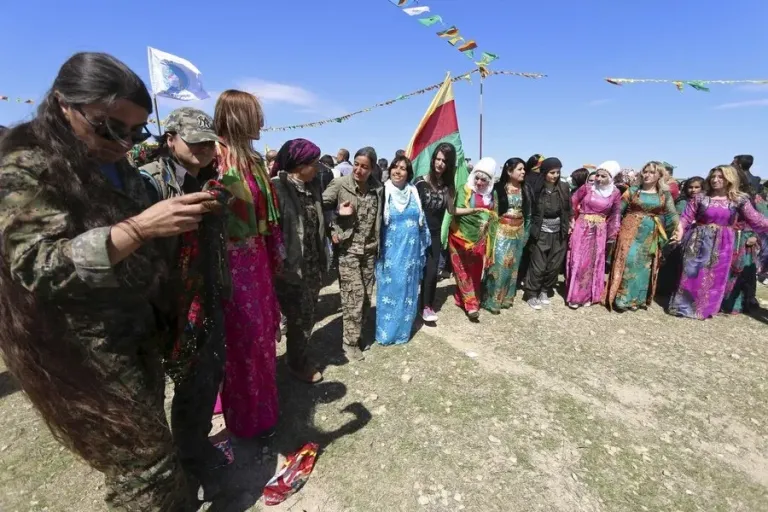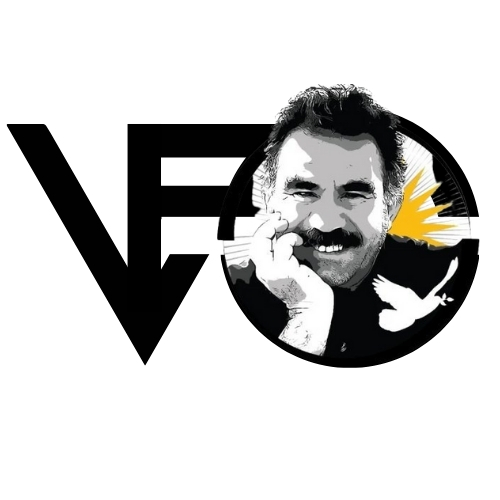Abdullah Öcalan has always provided ideological as well as organisational leadership. The Kurdistan Workers’ Party (PKK) was formed as a Marxist-Leninist independence movement, but, largely thanks to his leadership, the PKK and the wider Kurdish Freedom Movement have gone on to develop their ideas in response to bigger political changes, such as the collapse of the Soviet Union, and to their own experience on the ground. Through a critical engagement with Marxist theory and with the ideas of many other thinkers – notably Murray Bookchin, André Gunder Frank, Immanuel Wallerstein and Fernand Braudel – Öcalan has produced new understandings that have become a source of inspiration and hope throughout the world.

Before his capture, in 1999, Öcalan was able to develop ideas in discussion with his comrades, or hevals, to use the Kurdish term. In prison, he devoted himself to a further profound development of these ideas that amounts to a major reassessment of essential social and historical truths. His hevals have not had the opportunity to debate his new ideas with him, but they have been very active in developing them into the vital force of a lived social and political revolution.
Öcalan’s prison writings were written in the form of defence for his cases at the European Court of Human Rights, and have since been published as five books. In his last piece of writing before he was cut off from his lawyers in 2011, he explained, ‘For me, İmralı Prison has become a veritable battleground for reality with regard to understanding the phenomenon of the Kurds and the Kurdish issue, as well as constructing possibilities for a solution… Outside, it would have been very difficult for me to develop the ideas relating to the political philosophy that I have expressed in a more extensive and concrete manner in this defence.’
This new political philosophy emerged through engagement with the Kurdish issue, but its relevance is universal. Central to Öcalan’s rethinking is resistance against hierarchical social organisation and structures, including patriarchy and the state, and a focus on rejuvenating communal forms of organisation and being, where human society is understood as a continuum of the natural world. In this fundamentally humanist understanding, Öcalan wants to liberate the mutually supportive networks that form the essence of human society from the straitjacket that has been imposed by ‘civilisation’. The current straitjacket is what Öcalan calls ‘Capitalist Modernity’, and he wants to replace it with, to use his phrase, ‘Democratic Civilisation’.
At the centre of Öcalan’s vision is an empathetic approach to social relations that knits together personal and structural change and allows the movement to become a microcosm of the society it wants to create. The community organisation that this nurtures is a source of strength and inspiration in itself.

Democratic Civilisation builds on positive community bonds while stripping away millennia of hierarchical structures, beginning with the oppression of women – ‘the oldest colony’. For Öcalan, women’s freedom is fundamental, and this belief is put into practice by the Kurdish Freedom Movement, where women take leading roles in the struggle, and their place is ensured through co-chairships and quotas, alongside additional autonomous women’s organisation. This is a very different approach to the individualism of liberal feminism, which worries about the lack of female CEOs. It is part of a remaking of society that seeks to dismantle structures of power and to reprioritise those reciprocal and supportive relationships that have come to be denigrated as ‘feminine’ and therefore unimportant. Self-criticism, as well as observation of surrounding society, has enabled Öcalan to lead the struggle against male dominance and what today is often described as toxic masculinity. The aim is not to ostracise men, but to help them to change as part of changing society.
In every society there are community-based networks and organisations. Without them, the superstructures of Capitalist Modernity would grind to a halt. What the Kurdish Freedom Movement has achieved, through Öcalan’s ideas, is to raise the consciousness of people at the grassroots so that communities take control of their own lives and become agents of political change. Politics becomes a part of life in which everyone has a role to play, not something done to you by others.
In Öcalan’s Democratic Civilisation, society is structured through a direct democracy, organised from the bottom up, with local communities sending delegates to regional meetings to decide on those things that cannot be organised locally. Rather than attempt to take over state structures, and repeat the old hierarchies under a new name, Öcalan’s revolution attempts to bypass the state. In northern Syria, the power vacuum created by the civil war provided an opportunity to begin to put these ideas into practice and to show what can be achieved, even under conditions of war and boycott.
Öcalan’s politics were inspired by the Kurds’ demand for cultural freedom and equality. He not only demands this for Kurds, but for all groups. Organisational structures are designed to ensure the active political involvement of different groups and that they all have the cultural opportunities the Kurds have been struggling for. This approach has been important in helping to mend the fractured politics of northern Syria.
In Öcalan’s vision, community-based organisation replaces the capitalist compulsion for growth with a very different understanding of economy, based on community needs. And nature is no longer a resource to be controlled and exploited, but an ecosystem of which humanity is an integral part. Under wartime pressures, these ideas have been the least developed on the ground, but they remain a vital component of the overall understanding, and emphasise its relevance to all those seeking an alternative to a system that currently threatens us with planetary destruction.

Öcalan’s ideas have been recognised as hugely important. Even those who do not agree with his every argument are able to welcome the contribution he has made to the development of progressive politics both in theory and – vitally – in practice; and he has done this at a time when it has never been more needed.
Up until 2011, the Turkish authorities ensured that his ability to study and write was handicapped by rules that limited his access to books and severely restricted his external communication. Since 2011 he has been able to produce no more ‘defence statements’ because he has been denied access to his lawyers. Öcalan’s isolation deprives the whole world of his further thoughts and of the opportunity to discuss his ideas with him.
For further information and links, see

